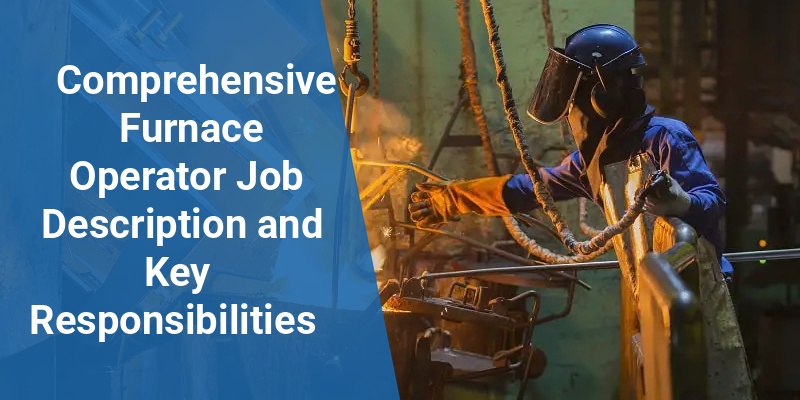The role of a furnace operator is critical in industries that require precise temperature regulation for manufacturing, metalwork, and chemical processes. A furnace operator ensures safe and efficient furnace operation, monitors furnace conditions, and maintains production quality. This article provides a detailed overview of the furnace operator’s duties, skills, and the environment in which they work.
| Aspect | Description |
|---|---|
| Primary Role | Operating and monitoring industrial furnaces |
| Industries | Metallurgy, manufacturing, glass production, chemical processing |
| Key Skills | Technical knowledge, safety compliance, troubleshooting |
| Work Environment | Industrial plants, high-temperature zones |
| Certification | Often required or preferred depending on industry standards |
Core Responsibilities of a Furnace Operator
A furnace operator plays a vital role in the manufacturing ecosystem, responsible for the setup, operation, and maintenance of furnace equipment. Typical responsibilities include:
- Starting and shutting down the furnace according to safety protocols and production schedules.
- Monitoring furnace temperature, pressure, and other operational parameters using control panels and gauges.
- Loading raw materials such as metals, ores, or glass components into the furnace accurately.
- Performing routine inspections and preventive maintenance to avoid equipment failures.
- Adjusting furnace controls to stabilize temperature and ensure product quality.
- Recording operational data and reporting inconsistencies or malfunctions to supervisors.
- Ensuring compliance with all safety regulations and environmental guidelines.
- Collaborating with maintenance teams to repair or upgrade furnace machinery when necessary.
Essential Skills and Qualifications for Furnace Operators
To be effective and safe, furnace operators must possess a set of technical and interpersonal skills. These include:
- Technical Proficiency: Familiarity with furnace technology, thermal systems, and industrial automation.
- Safety Awareness: Understanding of health and safety regulations related to high-temperature operations and hazardous materials.
- Attention to Detail: Ability to monitor complex systems and detect anomalies immediately.
- Problem-Solving Skills: Capability to troubleshoot equipment and process issues promptly.
- Physical Stamina: Capacity to work in hot environments and handle physically demanding tasks.
- Communication: Efficiently report information and collaborate within a team.
- Certifications: HVAC or industrial furnace certifications are often preferred and sometimes mandatory.
Work Environment and Safety Considerations
Furnace operators typically work in industrial settings characterized by high heat and potentially hazardous conditions. Ensuring worker safety is paramount:
- Use of personal protective equipment (PPE) such as heat-resistant gloves, face shields, and flame-retardant clothing is mandatory.
- Strict adherence to OSHA regulations and company safety protocols is required.
- Work shifts may include nights, weekends, or overtime due to continuous furnace operation needs.
- Operators must be trained in emergency response procedures related to fire hazards and equipment malfunction.
- Ventilation systems and cooling measures are important to maintain a tolerable working atmosphere.
Common Tools and Technologies Used by Furnace Operators
Modern furnace operation integrates advanced technology and traditional tools. Furnace operators use:
- Digital Control Systems: Programmable logic controllers (PLCs) and touch-screen interfaces to monitor and control furnace functions.
- Temperature Sensors and Thermocouples: For precise temperature measurement inside the furnace.
- Material Handling Equipment: Cranes, conveyor belts, and loading machines to manage furnace inputs and outputs.
- Maintenance Tools: Wrenches, calibration devices, and inspection cameras for upkeep and troubleshooting.
- Safety Equipment: Fire extinguishers, gas detectors, and alarm systems integrated within the workplace environment.
Career Path and Advancement Opportunities for Furnace Operators
The furnace operator position offers several progression routes, including:
- Senior furnace operator or shift supervisor roles, overseeing teams and operations.
- Specializing in furnace maintenance or instrumentation control.
- Advancing to industrial engineering or plant management positions with additional training.
- Certifications in welding, metallurgical analysis, or HVAC technology can provide upward mobility.
- Transitioning into safety inspector or compliance officer roles within manufacturing facilities.
Salary Expectations and Job Outlook
| Aspect | Details |
|---|---|
| Average Salary | $40,000 to $60,000 annually depending on experience and industry |
| Job Growth | Steady demand linked to industrial production and manufacturing advancements |
| Industry Demand | High in steel, glass, chemical, and energy sectors |
| Geographical Hotspots | Industrial regions in the Midwest, South, and coastal urban centers |
According to the Bureau of Labor Statistics, furnace operators enjoy a stable job outlook as manufacturing and metal industries continue to rely on skilled operators for efficient production.
Call 888-906-9139 for Free Local HVAC Quotes – No Obligation, Just Savings!
